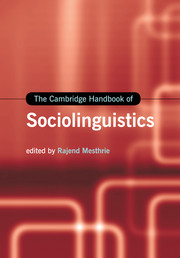Book contents
- The Cambridge Handbook of Sociolinguistics
- Series page
- The Cambridge Handbook of Sociolinguistics
- Copyright page
- Contents
- Figures
- Tables
- Contributors
- Preface and acknowledgments
- Abbreviations
- 1 Introduction: the sociolinguistic enterprise
- Part I Foundations of sociolinguistics
- Part II Interaction, style, and discourse
- Part III Social and regional dialectology
- Part IV Multilingualism and language contact
- Part V Applied sociolinguistics
- 20 Language planning and language policy
- 21 Sociolinguistics and the law
- 22 Language and the media
- 23 Language in education
- Notes
- References
- Index
20 - Language planning and language policy
from Part V - Applied sociolinguistics
Published online by Cambridge University Press: 05 June 2012
- The Cambridge Handbook of Sociolinguistics
- Series page
- The Cambridge Handbook of Sociolinguistics
- Copyright page
- Contents
- Figures
- Tables
- Contributors
- Preface and acknowledgments
- Abbreviations
- 1 Introduction: the sociolinguistic enterprise
- Part I Foundations of sociolinguistics
- Part II Interaction, style, and discourse
- Part III Social and regional dialectology
- Part IV Multilingualism and language contact
- Part V Applied sociolinguistics
- 20 Language planning and language policy
- 21 Sociolinguistics and the law
- 22 Language and the media
- 23 Language in education
- Notes
- References
- Index
Summary
- Type
- Chapter
- Information
- The Cambridge Handbook of Sociolinguistics , pp. 357 - 376Publisher: Cambridge University PressPrint publication year: 2011
- 6
- Cited by



